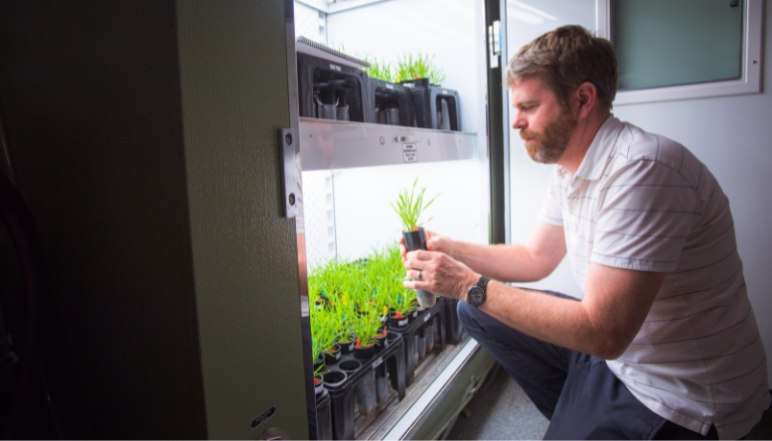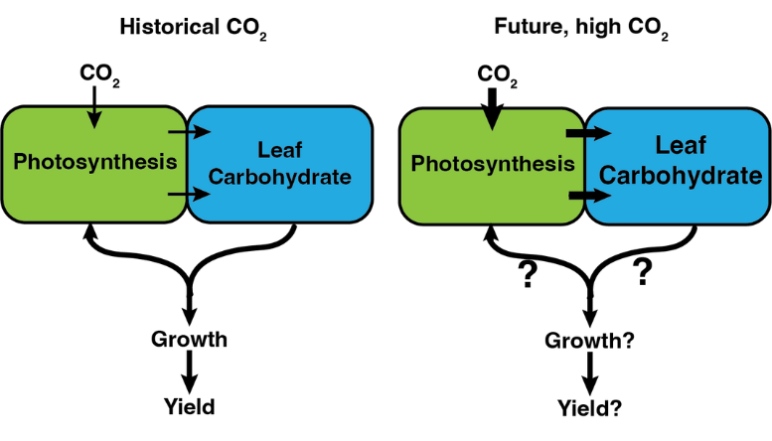Our Research Optimizing cereal crop plant architecture during an era of high atmospheric CO2

Prof. Des Marais works with the model grass species Brachypodium in plant growth chambers on the MIT campus. Credit - Dave Des Marais

Under a future, high CO2, growing environment plants may not fully exploit the "extra" CO2 available for growth. The proposed work aims to understand the mechanisms that control carbon allocation to harvestable yield. Credit – D. Des Marais
Principal Investigator
David L. Des Marais
- Cecil & Ida Green Career Development Professor
- Associate Professor of Civil and Environmental Engineering
- Department of Civil and Environmental Engineering
David Des Marais is the Cecil and Ida Green Career Development Professor and an assistant professor in the Department of Civil and Environmental Engineering. He received a BA from UC Berkeley and a PhD from Duke University. Dave began focusing on plant ecophysiology while a post-doctoral fellow at the University of Texas, Austin. Current topics of interest include the regulatory control of stress response, resource partitioning, and climate resilience. A central theme of the Des Marais Lab is understanding the mechanisms and consequences of genotype-by-environment interaction, the widely observed phenomenon that different plant varieties respond differently to common environmental cues.
Challenge:
Can we understand the molecular genetic control of plant growth responses to elevated CO2 with the aim of maximizing crop yields in the coming decades?
Research Strategy
- Explore how CO2 availability impacts the development of new branches in grass species using specially built plant growth chambers that can control the concentration of CO2 in the atmosphere
- Study how gene expression controls branch development and whether this is affected by the growing environment
- Use the complete genome sequences for the model grass species Brachypodium and wheat, oat, and barley to identify genes relevant for branch growth across these species
- Work with colleagues in the private sector to integrate findings into breeding strategies to maximize crop yield under future CO2 scenarios
Project description
The Green Revolution improved agricultural productivity by unifying modern engineering, plant breeding, and agronomic practices in the world’s farmlands. The global environment in which these improvements were made no longer exists. Today's crop plant experiences significantly higher atmospheric CO2 then they were bred for even 20 or 30 years ago. Many crop plants such as wheat, oat, barley, and rice may increase their growth rate and biomass when grown at experimentally elevated atmospheric CO2. This is the so-called “CO2 fertilization effect” which has been widely touted in the popular press as a beneficial side-effect of anthropogenic CO2 emissions. While the positive effect of elevated CO2 on plant carbon assimilation is widely observed, the allocation of this extra fixed carbon to harvestable yield remains more tenuous, with tremendous variation among crop species and even among varieties of single crops. This project will explore the genetic and physiological control of growth rate variation in response to elevated CO2 in the model grass species Brachypodium and several closely related cereal crops. The work will focus on the developmental origin of grass tillers—branches—addressing whether varying CO2 fertilization responses arise from the constitutive expression of tillers, or in the environmental control of these tillers.
News
Additional Details
Impact Areas
- Food
Research Themes
- Soil Fertility & Crop Productivity
- Transforming Food Systems
Year Funded
- 2023
Grant Type
- Seed Grant
Status
- Ongoing

